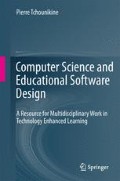Abstract
This chapter disentangles different notions related to educational software. The result is a design-oriented conceptualization, i.e., a differential system of notions that puts to the fore dimensions and differences of importance when considering design and analysis of educational software properties.
Access this chapter
Tax calculation will be finalised at checkout
Purchases are for personal use only
Notes
- 1.
See for example Leplat, J. (1990). Relations between task and activity: elements for elaborating a framework for error analysis, Ergonomics, 33 (10 & 11), 1389–1402 or Engeström, Y., Miettinen, R. & Punamäki, R.-L. (1999). Perspectives on Activity Theory. Cambridge: Cambridge University Press.
- 2.
van Joolingen, W.R. & Zacharia, Z.C. (2009). Developments in Inquiry Learning. In: Balacheff, N., Ludvigsen, S., de Jong, T., Lazonder, A. & Barnes, S. (Eds.) Technology-Enhanced Learning – Principles and Products, Berlin: Springer, 21–37.
- 3.
Tchounikine, P. & Tricot, A. (under press). Environnements informatiques et apprentissages humains. In: Garbay, C., Kayser, D. (Eds.), Informatique et Sciences Cognitives : influences ou confluences? Ophrys/MSH, 167–200.
- 4.
van Joolingen, W.R. & Zacharia, Z.C. (2009). Developments in Inquiry Learning. In: Balacheff, N., Ludvigsen, S., de Jong, T., Lazonder, A. & Barnes, S. (Eds.), Technology-Enhanced Learning – Principles and Products, Berlin: Springer, 21–37.
- 5.
On this point, see for example the concept of embodied conjecture in Sandoval, W.A. (2004). Developing Learning Theory by Refining Conjectures Embodied in Educational Designs. Educational Psychologist, 39(4), 213–223.
- 6.
See for example Fischer, F., Kollar, I., Mandl, H. & Haake, J.M. (Eds.) (2007). Scripting Computer-Supported Collaborative Learning – Cognitive, Computational, and Educational Perspectives. Computer-Supported Collaborative Learning Series v. 6, New York: Springer.
- 7.
This is not, however, intrinsic to this approach. CSCL scenarios may be explicitly associated with domain-related knowledge or transversal skills, and the designed systems address these dimensions, see for example Tchounikine, P., Rummel, N. & McLaren, B.M. (2010) Computer Supported Collaborative Learning and Intelligent Tutoring Systems. In: Nkambou, R., Mizoguchi, R. & Bourdeau, J. (Eds.), Advances in Intelligent Tutoring Systems, SCI 308, Berlin: Springer-Verlag, 447–463.
Author information
Authors and Affiliations
Corresponding author
Rights and permissions
Copyright information
© 2011 Springer-Verlag Berlin Heidelberg
About this chapter
Cite this chapter
Tchounikine, P. (2011). A General Conceptualization for Educational Software. In: Computer Science and Educational Software Design. Springer, Berlin, Heidelberg. https://doi.org/10.1007/978-3-642-20003-8_2
Download citation
DOI: https://doi.org/10.1007/978-3-642-20003-8_2
Published:
Publisher Name: Springer, Berlin, Heidelberg
Print ISBN: 978-3-642-20002-1
Online ISBN: 978-3-642-20003-8
eBook Packages: Computer ScienceComputer Science (R0)

